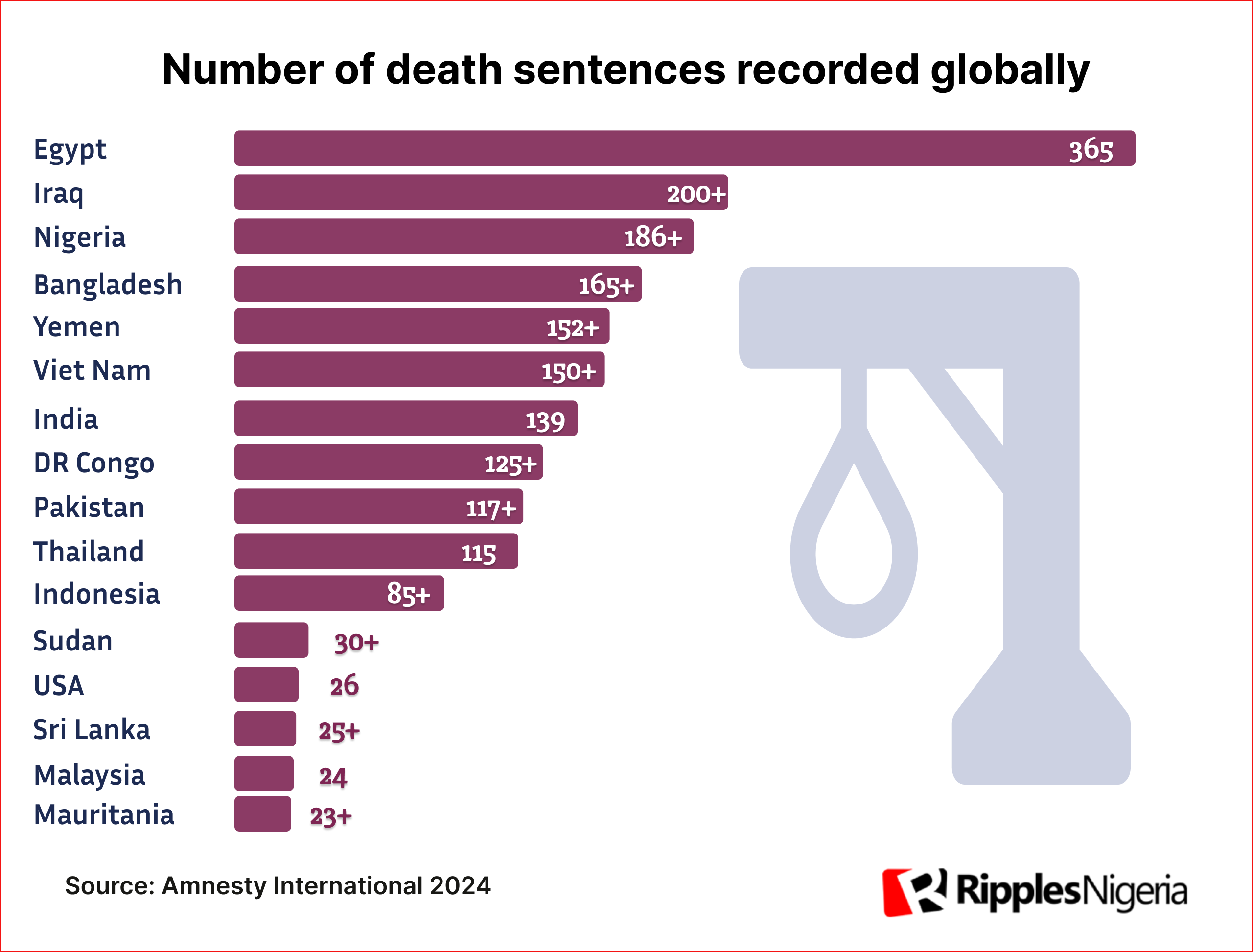Ripples Metrics
RipplesMetrics: Nigeria is second highest in death sentencing, as Africa shows alarming trends in 2024

Two high-profile murder cases in Nigeria have resulted in death sentences for the convicted individuals. In Abuja, the Federal Capital Territory High Court sentenced Peter Nwachukwu to death by hanging for the murder of his wife, gospel singer Osinachi Nwachukwu, who was initially believed to have died of throat cancer in April 2022. Judge Njideka Nwosu-Iheme found him guilty of culpable homicide.
Meanwhile, in Lagos, a High Court at Tafawa Balewa Square convicted BRT driver Andrew Ominikoron of the rape and murder of 22-year-old fashion designer Bamise Ayanwola. The incident occurred in February 2022 when Bamise went missing after boarding a BRT bus. Ominikoron was found guilty on all five counts, including conspiracy, rape, and murder, and was also sentenced to death.
Findings by Ripples Metrics showed that a report from Amnesty International has placed Nigeria among the top three countries globally for the number of death sentences handed down in 2024, with over 186 individuals sentenced to death by Nigerian courts.
A death sentence, also known as capital punishment, is a legal penalty in which a person is sentenced by a court to be executed as punishment for a crime they have been found guilty of committing. It is the most severe form of punishment a legal system can impose. The death penalty is authorised by Section 33 of the Constitution of Nigeria. Being sentenced to death means a court has officially ordered that a convicted individual be put to death as punishment for a crime.
This figure signals the country’s continued reliance on capital punishment amid growing global calls for its abolition.
READ ALSO: NGX: Equities market ends week with N313bn loss for investors
Globally, Egypt led the grim chart with 365 death sentences, accounting for the highest number recorded anywhere in the world. Egypt’s figure alone is almost double that of Iraq, which followed with 200+ death sentences. Nigeria’s tally of 186+ puts it just behind these two, ahead of several countries with long-standing histories of capital punishment.
Africa’s Position in the Global Context
Africa had a strong presence in the 2024 global death penalty statistics, with five countries making it into the top 18. After Egypt and Nigeria, the Democratic Republic of Congo (DR Congo) recorded 125+ death sentences, the third-highest among African nations and eighth globally. Sudan also appeared in the data with 30+ death sentences, while Mauritania, a country with a much smaller population, handed down 23+ death sentences.
This shows a regional trend: despite increasing advocacy for abolishing the death penalty across Africa, the practice persists robustly in some of its most populous and politically complex nations.
Global outlook
While Africa’s figures are concerning, Asia remains heavily represented in the top 18. Bangladesh handed down 165+ death sentences, placing it fourth overall. Yemen followed with 152+, Vietnam with 150+, and India recorded 139. Other Asian countries included in the list are Pakistan (117+), Thailand (115), Indonesia (85+), Sri Lanka (25+), and Malaysia (24).
Meanwhile, the United States, the only Western nation on the list, recorded 26 death sentences in 2024. This figure, though lower compared to the leading countries, highlights America’s continued use of the death penalty—a rarity among Western democracies. Nonetheless, it falls far below the rates observed in several African and Asian countries.
The continued application of the death penalty in Nigeria and its African peers raises deep concerns among human rights groups. In Nigeria, the prison system is overwhelmed, with hundreds languishing on death row without timely appeals or reviews of their cases. With more than two-thirds of the world’s countries having abolished the death penalty in law or practice, the persistence of capital punishment in countries like Nigeria, Egypt, and DR Congo reflects a troubling resistance to global trends.
By: James Odunayo
Join the conversation
Support Ripples Nigeria, hold up solutions journalism
Balanced, fearless journalism driven by data comes at huge financial costs.
As a media platform, we hold leadership accountable and will not trade the right to press freedom and free speech for a piece of cake.
If you like what we do, and are ready to uphold solutions journalism, kindly donate to the Ripples Nigeria cause.
Your support would help to ensure that citizens and institutions continue to have free access to credible and reliable information for societal development.




























